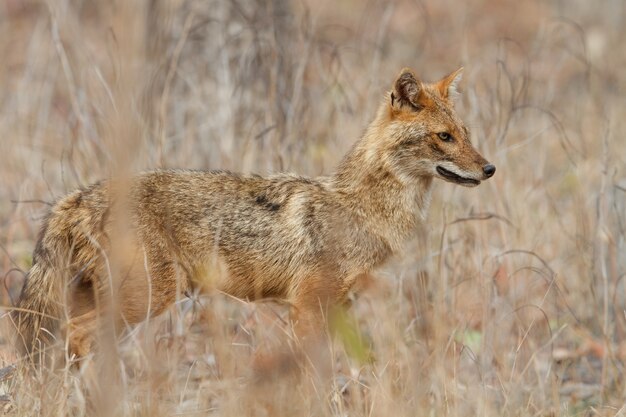Coyote Facts – Discovering the Wild World of a Resourceful Predator

Coyotes are highly adaptable animals that can be found in a range of habitats, from forests to deserts.
Coyotes are part of the canine family and are closely related to wolves and domestic dogs.
Despite their reputation as pests, coyotes play a vital role in controlling populations of rodents and other small mammals.
Coyotes have excellent hearing and can detect sounds from up to a mile away.
Coyotes are known for their distinctive howling, which is used for communication with pack members.
Coyotes have a keen sense of smell and can detect prey from long distances.
Coyotes are opportunistic hunters and will eat almost anything they can find, including small mammals, birds, reptiles, and even fruits and vegetables.
Coyotes are primarily nocturnal animals, meaning they are most active during the night.
Coyotes are incredibly agile and can run at speeds of up to 40 miles per hour.
Despite their speed, coyotes are also excellent swimmers and can traverse bodies of water with ease.
Coyotes are known for their intelligence and adaptability, making them successful survivors in various environments.
Coyotes are monogamous animals and mate for life, forming strong family units.
Coyotes have a gestation period of about 60 days, after which they give birth to a litter of pups.
Coyote pups are born blind and helpless, relying on their parents for protection and care.
Coyotes are excellent parents and both the mother and father take part in raising the pups.
Coyote Facts – Discovering the Wild World of a Resourceful Predator part 2
Coyotes have a wide variety of vocalizations, including barks, yips, growls, and howls.
Coyotes have a diverse diet, depending on their habitat and availability of food sources.
Coyotes are known for their ability to adapt to urban environments and can often be seen in suburban neighborhoods.
Coyotes have been known to form symbiotic relationships with other animals, such as badgers or crows, to enhance their hunting success.
Coyotes are highly territorial and will aggressively defend their territories from intruders.
Coyotes are excellent diggers and will dig dens for shelter and raising their pups.
Coyotes have a lifespan of about 10-14 years in the wild.
Coyotes have been known to form complex social hierarchies within their packs.
Coyotes are generally solitary animals but may form packs in certain situations, such as during the mating season.
Coyotes are one of the most widespread and successful carnivorous species in North America.
Coyotes are known for their curiosity and will often investigate new objects or scents.
Coyotes have excellent vision, allowing them to spot prey from long distances.
Coyotes have a natural fear of humans and will typically avoid contact whenever possible.
Coyotes have a unique hunting technique called courting, where they lure their prey into a trap by pretending to be weak or injured.
Coyotes have been known to exhibit playful behavior, such as chasing their tails or pouncing on objects.
Coyotes have been observed forming strong bonds with their pack members and displaying affectionate behaviors.
Coyotes are highly adaptable to changes in their environment and can thrive in both rural and urban areas.
Coyotes are known for their patience and will often wait for hours before making a move on their prey.
Coyotes have a diverse range of fur colors, including shades of gray, brown, red, and even black.
Coyotes have a unique trotting gait, where they alternate between a walk and a run to conserve energy.
Coyotes have been known to scavenge for food, especially in areas where natural prey is scarce.
Coyotes have a complex vocal communication system, allowing them to coordinate their activities and warn each other of potential dangers.
Coyotes have been known to adapt their hunting strategies based on the availability of food sources, sometimes preying on larger animals such as deer.
Coyotes are highly intelligent animals and have been observed using tools, such as sticks or rocks, to access food or defend themselves.
Coyotes have a unique ability to regulate their population size based on available resources, which helps maintain a balanced ecosystem.
Coyotes have been known to form strong bonds with their human caretakers, particularly in captive or rehabilitation settings.
Coyotes have an excellent sense of direction and can navigate long distances using landmarks and their knowledge of the terrain.
Coyotes have strong jaw muscles, allowing them to crush bones and eat even the toughest of prey.
Coyotes have a strong sense of loyalty to their pack members and will protect them from threats, even at the cost of their own lives.
Coyotes are fascinating creatures that continue to intrigue researchers and wildlife enthusiasts alike with their remarkable adaptability and survival skills.